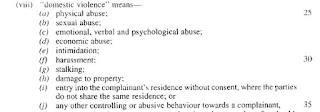Hello, everyone!
I admit that I do not write here very often. When I do write something on this blog it is usually I am having a very quiet time at work and then use this platform as a means to get the public's attention.
Today's post, however, is something for which I have specially made time during a really busy month because it deals with something that is often much needed by divorce clients, but not so often obtained by attorneys. I will explain the reason for this very shortly.
If you have read some of my earlier posts you will know by now that I do not take a "chapter-and -verse" approach that involves the quoting of legislation and case law.
My reason for writing the way I do is mainly because these posts are not intended for some legal journal or a doctoral thesis on any aspect of law. It is also not for my colleagues to take note of, but for you- the people.
This is why I keep this kind of post simple and why I try my best to make it the least boring legal article that you are likely to read.
Now- what this post is actually about:
I have recently gotten the Domestic Violence Court to order my client's husband to pay my client money.
It sounds strange, right?
The Domestic Violence Court is there for issuing protection orders (what the people in the U.S. call "restraining orders"), not to make any awards for money to be paid, right?
Well... Not exactly-
You see- domestic violence can take on a number of forms- in our law that number is 10, actually...
If you want to know all 10 of the forms domestic violence can take you can read this short excerpt from Section 1 of our country's Domestic Violence Act (That is Act 116 of 1998 for those who are actually interested in reading the entire Act...):

Noticed (d) in the excerpt above? It names "economic abuse" as a form of domestic violence.
We all know what economic abuse is, don't we?
Well- not all of us...
That's okay- It is easy to explain.
In many domestic relationships, be it a marriage, an unmarried couple living together or that of parent/ guardian and child we find that one party to this relationship is financially dependent on the other. The breadwinner in this relationship can easily use this financial dependence to hurt or manipulate the dependent party- and in many cases they do just that.
In my client's case her husband wanted to put pressure on her to agree to the least expensive settlement for him before the divorce proceedings started so- before going to see a lawyer he told her that she had a month to get out of the house and that he has cancelled the lease to their home and will also stop paying the rent after this month...
So- what is she to do?
The Maintenance Court will give this man 2 weeks to come to court with his bank statements and then take another month to get this matter heard by a Magistrate.
We have not yet even issued a divorce summons and even if we did a Rule 43 (High Court)/ Rule 58(Regional Court) application (for maintenance to be paid pending divorce proceedings) have the inherent weakness of giving the Respondent 10 work days to file his answering affidavit (which he usually delivers to your attorney late in the afternoon on the 10th day) and then the matter gets heard only in the next month- if you are that lucky!
By that time the rent is already skipped and the Landlord already scrambling to get my client and her children out of the house! If he is a good law-abiding landlord it would mean that my client now has the added burden of eviction proceedings and if he is a bit more of a loose canon my client could find the doors to her home removed and all her possessions strewn across the street in front of the house! (Don't laugh. I actually sympathise with these landlords, because they have most likely become disillusioned with our legal system when they had a family of freeloaders dealing insane amounts of damage to their homes before they eventually took their leave... I digress now, however. Let's get back to the topic at hand...).
So- we couldn't pass this buck to any other court. We know now that the Domestic Violence Act knows about a thing such as "economic abuse", but how does it deal with it?
The answer to that question lies with Section 7(4) of the Act that reads as shown below:

Well- I would have preferred to have the section say that non-compliance with the order is a criminal offence and a one-way ticket to
stoxing (prison) like the case is with contravention of protection orders in respect of other forms of domestic violence, but I can work with this as well...
Now- I have mentioned that many attorneys have tried and failed to get this kind of order. The main reason for this is because they miss the difference between preventing or stopping an act of domestic violence with compelling somebody to maintain a dependent.
What is the difference between the two?
There are actually a number of differences:
For one: Where the duty to maintain a spouse automatically exists during a marriage and the duty of a parent to obtain a child exists as long as the parent is the legal parent and guardian of that child- unmarried adults living together do not automatically have a duty to maintain one another. One of the parties can obtain that right by applying for a maintenance order, but then the court has to first determine whether the need exists and such right can be awarded to an applicant.
In the case of economic abuse the court needs only to know that the parties are in a domestic relationship- be it married, living together, related or in a romantic relationship and that the complainant is financially dependent on the respondent.
Secondly: A maintenance order covers a wide range of expenses starting with the most basic of the dependent's needs, but in appropriate cases branching out to those expenses that a dependent would have incurred in order to ensure his/ her education and to maintain living standards to which he/ she are accustomed.
Economic abuse does not go that wide. Your dad cancelled your horse riding lessons? Move on! That is not what the Domestic Violence Court is for.
Thirdly: The economic abuse that a complainant refers to this court has to strike at the very basic needs for human survival: food, a home, healthcare, medical treatment.
A man who has never maintained his child before can still get a maintenance order against him to do so. If somebody in a relationship has never before made certain payments to his partner then the Domestic Violence Court cannot introduce a new regime where he now has to make those payments.
It becomes an act of violence when the financial support on which somebody is dependent and accustomed to receiving suddenly gets withdrawn for no good reason- or for very bad reasons indeed...
Fourthly- A maintenance order can serve to improve the
status quo between the dependent and the breadwinner. An order for emergency monetary relief can only endeavour as far as possible to preserve the
status quo between parties. This is why a maintenance order application involves a detailed enquiry into the financial positions of the parties while in the case of an application for emegency monetary relief the court needs only to satisfy itself with the status quo before the sudden withdrawal of financial aid.
Lastly- I realise that I should probably have put this difference at the very op of this list- the operational word here is
"emergency". Emergency monetary relief is meant to avert a sudden crisis. To deal with an emergency. It implies that there is no time for coming back for a meeting in the Maintenance Officer's offices to get a court date somewhere in the next month.
I have now come at the end of this article, but anyone interested in finding out more about domestic violence proceedings, maintenance order applications or other related topics can contact me. My details are below:









